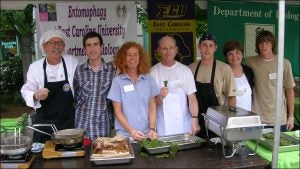ECU biologists cook, eat insects at BugFest

Hal Daniel, an East Carolina University biologist and anthropologist, believes insects could someday become a common, viable food source.
“They are a very valuable resources,” he said. “There is a worldwide distribution of insects and their abundance will create what I perceive to be as the ‘green food’ of the future.”
Daniel had an opportunity to share his message about the benefits of eating insects with about 20,000 people Aug. 13 during the annual Bugfest at the NC Museum of Natural Science in Raleigh. Assisted by spouses and several ECU biology students, Daniel and ECU biologist Claudia Jolls cooked up insect-centered cuisine, including cream of asparagus and katydid soup, sautéed cicadas a la romana, and collard-wrapped, deep-fried grasshoppers.
“The grasshopper and collard fritters have a real nice, eastern North Carolina flair to them,” Daniel said, who, along with ECU biology student Matt Walker, caught the grasshoppers. “We had a great time. I think we made over 500 collard-wrapped grasshoppers.”
During his presentation, “The ABCs of Entomophagy,” Daniel noted that insects are great sources of protein and are consumed by cultures all over the world, except for the United States and Europe. He pointed out that insects already get into food made in the United States, such as cereal, peanut butter and pasta sauce, but that most people still have psychological barriers that keep them from accepting insects as worthy of eating.
Insects, Daniel said, are high in protein and low in fats. Cicadas in eastern North Carolina, for example, contain as much protein, ounce for ounce, as most fish.
In addition to being naturally healthy, chasing after the insects can keep a person fit, Daniel said. One BugFest participant asked how to keep a freshly caught insect dinner from crawling or flying out of the fry pan.
“Oh, that’s easy,” Daniel said. “You just put ‘em in the freezer first.”
Daniel cautioned that insects that are brightly colored do not make for good eating.
“Anything like a ladybug, a colorful beetle, they have alkaloids, or toxins in them,” he said. “That keeps predators from consuming them.”
Like crops, certain insects flourish only during specific times of the year. Eating them, he said, can be a feast or famine situation.
“I don’t eat insects at every meal, but I think we should take advantage when there is an abundance,” he said. “The thing is, when you’re into entomophagy, you have to take advantage of what’s available.”